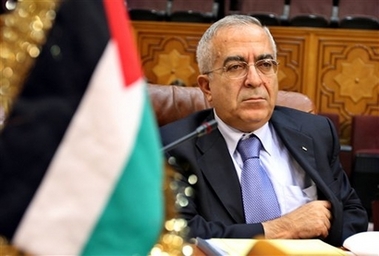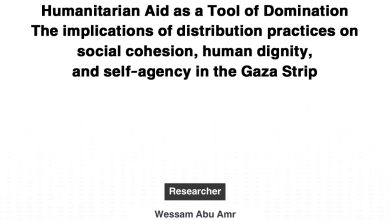New prime minister must be selected instead of Dr Salam Fayyad

By:Omar Shaban
In real democracies, it is normal to see people leave their positions. When politicians or managers leave their offices, it does not mean that their performance is bad. On the contrary, history is full of examples of great people who served their countries and nations well, and then they were taken down so they had to leave their positions. Consequently, their nations were not harmed, but the opposite happened; new leadership and new experiences came and added value to their institutions. In this context, we should also read Dr Fayyad’s arrival to the prime minister’s office as a new phase in the Palestinian political and administrative systems, therefore; changing Fayyad would be the same—a new phase with new face.
It would be sufficient for us to mention Charles de Gaulle, the French leader, who lead his nation’s struggle against the Nazi occupation. De Gaulle resigned from his position when his people demanded so. David ben Gurioun, who lead the Zionist movement, achieved its major objectives, and had established the foundations of Israel, he resigned after the establishment of Israel and left to his farm in the Negev desert with one purpose; to tell the Israelis that it would be possible to settle and construct the desert.
Dr Salam Fayyad, that served as the Palestinian prime minister for the last four years, represents a phase that has several positive and negative dimensions. With our appreciation to him and to his role, he must be changed as a prime minister for the following reasons:
First, changing the prime minister will send a message to the international community; a message stating that we have the will for change. And we, the Palestinians, do not believe in “personalizing” positions. In addition, we would let the world know that if change takes place in the Arab world with blood and fire, it would be the opposite in Palestine and would be through peaceful power and position transfers. We would let the entire world know that Palestinians reject the aspect of hanging on positions in politics.
Second, both the local and the international communities have developed an inaccurate conception concerning the presence of Dr. Fayyad as prime minister; the majority believes that the presence of Dr. Fayyad guarantees international funding for the Palestinian Authority. This conception is not true it rather harms the Palestinian people and their political system which should not in anyway be connected with the presence of particular figures.
Third, change has a positive impact when it takes place within our institutions; it gives hope for change to the Palestinian people, especially the youth, who represent more than half of the population. This change will also confirm the Palestinian people’s belief in power transfer, accountability, and evaluation.
Some people might argue that changing Dr. Fayyad would cut the international fund for the PA. In my opinion, this is completely inaccurate for several reasons. First, the international fund is a result of the donor’s conference held in Washington DC in 1993 with participation of several international agencies such as The World Bank and The International Monetary Fund. The aims of this conference was to support the newly birthed Palestinian Authority to do its role in promoting peace. Second, the International community will not allow the collapse of the PA because the existence of the PA is demanded by the international community. Third, the international community will not stop supporting the PA in order to assist it perform its tasks. Forth, the international community supports the PA for its political program not the person in the prime minister seat.
The functional distribution within the PA is between both the presidential institution and the prime minister. The presidential institution represents the political program of the PA. Thus, the role of the presidential institution is to meet the requirements of the international community in order to ensure political, physical, and financial support. On the other hand, the role of the prime minister is to manage the affairs of the Palestinian society.
The international community did not stop supporting the PA in the times of Yassir Arafat, but when it realized that the PA was not commited to what was expected from it on the political level the international support became limited. Before this, and even though there were reports about corruption, the international community was committed in supporting the PA. This means that the international community is committed to support the PA for its political program not for the presence of specific persons. Thus, when there were contradictions in the PA’s political position, the international community decided to get rid off Arafat, but at the same time, kept the PA.
The international community’s talk about credibility and corruption is not accurate; it is an attempt to use these perspectives as weapons against the PA and the Palestinian people when the international community needs to create pressure. It should be noted that the same international community kept silent concerning corruption within the PA in the past few years even though corruption does likely exist. Also, the same international community provided cover for the systematic theft of the third and Arab worlds’ recourse and wealth; that theft, was exposed in the revolutions of Egypt, Libya, and Tunisia where the Western banks proved to be cover-providers and accepted smuggling and hundreds of billions from the South (the Middle East) to the North (the West).
The Arab revolutions proved that change is inevitable and the angry masses are no longer tolerating the selfishness and keeping positions and power for long times. The Arab revolts represent the boarders between two stages; one of misusing authority monopolizing it, and the other one , in the sooner future, will be characterized by democratic and civilized transfer of power.
The Palestinian reality cannot be separated form the Arab one; winds of change will sooner or later come to Palestine. For this reason, those who are in decision making positions should understand the importance and the seriousness of what is happening in the Arab world, and should accelerate their efforts in considering steps that promote the concept of power transfer as well as to end any aspect of monopolizing positions and staying in them for long times.
This not only applies for the prime minister position, it also applied to everyone including the president, the prime minister, and even ministers themselves. For instance, Saeb Eriekat led the negotiation unit for 18 years and this caused its weakness and made it useless. Change should also take place in Palestine Investment Fund, Palestinian Monitory Authority, every official and semi-official institution, and even the political parties that became old are dying since years with leaders in their positions. even before Gaddafi came to power. What is happening in Libya by Gaddafi is an evidence of the gravity of sticking to chairs and positions.
The good performance of a president, a leader, or a manager doesn’t mean that this person has to stay in his position and not be changed; good performance is the duty of every person in a decision making level. For this reason, we should change the way we perceive those who lead us; they are the same as any employee in the state: they take their salaries in return of their good performance, and they are also should be exposed to accountability and change. Change is the constant principle and people are the variables.




